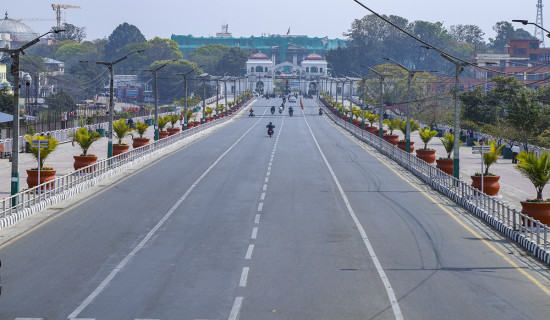- Wednesday, 4 March 2026
Addressing Mental Health Challenges
Our country’s approach to mental health care is a patchwork of underfunded programmes, neglected policies, and insufficient services that barely scratch the surface of a growing crisis. Patan Mental Hospital, the country's only government-run mental hospital, has as few as 50 beds and is overburdened with the rising number of patients requiring inpatient care. This is a dire situation, considering that mental health problems are becoming increasingly prevalent, particularly in the aftermath of the COVID-19 pandemic. In a country where the mentally ill are often subjected to stigmatisation and abuse, the state of psychiatric care is nothing short of a human rights disaster.
The National Mental Health Survey conducted by the Nepal Health Research Council (NHRC) between 2017 and 2020 revealed that 10 per cent of adults had experienced a mental disorder at some point in their lives, and 4.3 per cent were struggling with one during the study period. Among adolescents aged 13-17, 5.2 per cent were diagnosed with a mental disorder, most commonly neurotic and stress-related disorders. According to the World Health Organisation (WHO), mental illness accounts for 18 per cent of all non-communicable diseases in Nepal.
Investment
The main root of this problem is, however, glaringly obvious. Nepal’s mental health sector is woefully underfunded. The government’s investment in mental health, which receives less than 1 per cent of the total healthcare budget, is almost negligible. This lack of funding perpetuates a cycle of inadequate services, leading to dire consequences for those who genuinely need help the most.
Similarly, the shortage of mental health professionals is equally dire, as services are heavily concentrated in urban areas, with 0.16 psychiatrists and 0.02 psychologists available per 100,000 people. Adding to this problem is the lack of privacy and dignity in treatment. Many hospitals that offer mental health care don’t provide separate rooms for consultations, meaning patients often speak about sensitive issues within earshot of others. This is deeply problematic in a society where stigma and humiliation prevent people from seeking help in the first place.
The lack of political will, combined with deep-seated stigma and cultural attitudes amongst people, means that mental health issues will remain on the back burner. Even when action plans are proposed, they are crippled by insufficient funding, inadequate infrastructure, and bureaucratic incompetence. The government’s continuous neglect has condemned people to suffer in silence, with little to no hope of recovery or social rehabilitation.
Recently, the Health Minister announced plans for assigning mental health specialists to federal hospitals, collaborating with the Ministry of Education to include mental health in school curricula, and revising the School Nurse Programme. These are commendable intentions. However, with all due respect, what the public has seen so far is more discussion than delivery. The ministry continues to hold meetings, release statements, and promise future changes, but Nepal’s mental health infrastructure remains as fragile as ever. Plans remain stranded without deadlines or enforcement. This crisis has moved far beyond the stage of deliberation—we need action, not more talk. Without significant reform, Nepal’s mental health crisis will continue to be sidelined, leaving an already vulnerable population even further behind.
There are impactful ways we can begin to address the mental health crisis. For starters, we need funding. Currently, Nepal invests a negligible portion of its budget in this critical area, a figure that pales in comparison to other expenditures. By reallocating even a small percentage of the funds currently allocated as “miscellaneous expenses,” the government could make substantial progress in addressing the mental health crisis. This additional funding could support the recruitment of more mental health professionals, the establishment of new treatment centres, and the expansion of important facilities.
Health policy
Moreover, the government should also introduce additional incentives for professionals who are willing to work in remote areas. This would help ensure that mental healthcare services are more evenly distributed and not remain urban-centric. However, this is still not enough. Most importantly, the government needs to draft and implement a separate and comprehensive mental health policy that addresses the entire spectrum of mental health care, from prevention to treatment to rehabilitation.
It should not only improve psychiatric services but also integrate mental health into primary care, so that a visit to the local health post includes a mental health screening as well. It is deeply concerning that there is still no specific licensing body or legal framework in Nepal to regulate psychologists and counselors, which is why we need to establish a regulatory body that can license, regulate, and monitor practitioners and institutions to ensure ethical and standardised care across the country and build public trust in mental health services.
(The author is a student at a Kathmandu-based college.)






-original-thumb.jpg)










